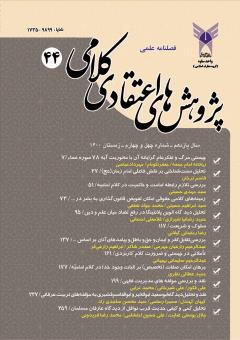نقد و بررسی مولفه های مدیریت فقهی
محورهای موضوعی : کلام اسلامیعلی فکور 1 , علی شیرخانی 2 * , محمد ترابی 3
1 - دانشگاه آزاد اسلامي، قم
2 - دانشگاه آزاد اسلامی، قم
3 - دانشگاه آزاد اسلامی، قم
کلید واژه: عبدالکریم سروش, فقه, مدیریت, مدیریت فقهی,
چکیده مقاله :
با پیروزی انقلاب اسلامی ایران و حاکمیت ولایت فقیه و ورود فقه جعفری به عرصه مدیریت کشور، رویکرد ها، تعاریف و جهت گیری های متنوعی درباره مدیریت فقهی ارائه شده است. دکتر سروش یکی از منتقدین معروف این عرصه می باشد. یکی از نقدهای اساسی ایشان به مدیریت فقهی، تناقض و عدم امکان چنین مدیریتی است. ایشان با بیان اینکه کار فقه فقط بیان احکام رفع خصومت است نه برنامهریزی، تدبیر جامعه را به علم می سپارد و مدیریت فقهی را در تقابل با مدیریت علمی معرفی می کند. تحقیق پیش رو قصد دارد با روش عقلی و فلسفی به تبیین و نقد نظر ایشان بپردازد و در کشف معنای عمیق و درست مدیریت فقهی و صیانت از آن در برابر شبهات قدم بر می دارد. نتیجه به دست آمده از تحقیق بیانگر این است که بر خلاف پندار دکتر سروش، ادیان به طور اعم و اسلام به طور اخص از برنامه ریزی و مدیریت بیگانه نیستند بلکه شریعت الهی در بطن خود مدیریت لازم، برای اداره کشور را دارا است و قواعد کلی برای تطبیق بر جزییات در تمام اعصار را دربر دارد و مدیریت فقهی به معنی نفی مدیریت علمی نیست بلکه به معنی سنجش قواعد علوم با ارزشهای دینی و احکام الهی (فقه اکبر) میباشد زیرا فقه به معنای احکام فردی، فقه اصغر است و فقه به معنای اعم، فراتر از این و اعم از باورها، ارزش ها، مشروعیت و مناسک در تمام ابعاد فردی و اجتماعی است.
Dr. Soroush is one of the theorists of the contemporary period who has raised several problems from the impossibility and contradiction of jurisprudential management to the pests of the operation of such management. He states that the main goal of religion is the Hereafter and accordingly does not consider religion to have a plan for the affairs of the world, especially the government and the general management of society. Of course, jurisprudence as a part of religion has social rules related to the world, but Dr. Soroush, stating that firstly the work of jurisprudence is only to express the ruling and not planning and management and secondly the rules of minority jurisprudence are limited to eliminating hostilities and worship. , Does not consider this part of religion, like the whole religion, to be useful for managing worldly affairs. On the other hand, he considers this worldliness to be one of the shortcomings of jurisprudence in the management of the religious community and does not necessarily consider the government and the jurisprudential community to be religious and moral. He has concluded from the worldliness, the purpose of the transcendence and minority of jurisprudence, the transcendence and continuity of jurisprudence, then they consider the permanent knowledge of jurisprudence due to being based on secret materials as another plague of jurisprudential rule in addition to the principle The fact that jurisprudence is based on secret materials also causes the inefficiency of jurisprudence in society. He also considers the central task of jurisprudence to be contrary to human rights and does not consider the task-oriented jurisprudential government to be democratic. The present research, due to the necessity of answering such doubts and problems, explains and criticizes their opinions in a rational and philosophical way.
قرآن
تقوی، سیدرضا(1368)، نگرشی بر مدیریت اسلامی. تهران: انتشارات سازمان تبلیغات اسلامی.
جمال الدين، محمدبن مكرم بن منظور( 1377). لسان العرب. تهران: انتشارات صبا.
جوادی عاملی، عبد الله( 1389)، دین و مدیریت کارآمد. مجله پاسدار اسلام.شماره 296.
جوهرى، اسماعيل بن حماد، الصحاح(393 ه ق)، تاج اللغة و صحاح العربية، چاپ اول. بيروت – لبنان: دار العلم للملايين
حر عاملی، محمدبن حسن(1409ق)، وسائل الشیعة الی تحصیل مسائل الشریعه. مصحّح: گروه پژوهش مؤسسه آل البیت. چاپ اول. قم: انتشارات مؤسسه آل البیت (ع).
حسن بن زین الدین(بی تا). معالم الدین، قم: دفتر انتشارت اسلامی.
خسرو پناه، عبدالحسین(1388)، فقه در محک زمانه، چاپ اول، تهران: کانون اندیشه جوان
رضاییان، علی(1384). اصول مدیریت، تهران: انتشارات سمت،چاپ17.
زمخشری، محمودبن عمر(1407 هق)، الکشاف عن حقائق التنزیل. چاپ سوم. بیروت: دار الکتاب العربی
سروش،عبدالکریم(1388).فربه تر از ایدیولوژی،تهران: موسسه فرهنگی صراط.
.............................(1376).مدارا و مدیریت،تهران: موسسه فرهنگی صراط.
.............................(1378). فقه در ترازو. کیان شماره 46.
............................ .(1372). فربه تر از ایدیولوژی. کیان شماره14.
............................ (1372). حکومت دموکراتیک دینی.کیان شماره 11.
............................ .(1384). من و مصباح هم داستانیم. بازتاب اندیشه 67.
............................ ( 1385). سنت و روشنفکری دینی. بازتاب اندیشه84.
............................ .(1377). دین اقلی و اکثری. کیان شماره41.
............................ (1377). ذاتی و عرضی در دین. کیان شماره42.
............................. 1375. تحلیل مفهوم حکومت دینی. کیان شماره32.
............................. 1374. خدمات و محسنات دین. کیان شماره 27.
شهیداول، محمد بن مکی، القواعد و الفواید، چاپ اول، قم: انتشارات کتابفروشی،بی تا.
شهیدثانی، زین الدین بن علی(1398)، منیه المرید فی آداب المفید و المستفید. قم: بوستان کتاب قم.
طبرسى، امین الدین ابوعلى الفضل بن الحسن. مجمع البیان. تهران: ناصر خسرو. بی تا.
طباطبایی، سیدمحمدحسین(1417 ق)، تفسیرالمیزان. بیروت: موسسه الاعلمی للمطبوعات.
طوسی، ابوجعفر، محمدبن حسن( 1403 هق)، عده الاصول. چاپ اول. قم: انتشارات آل البیت.
طوسی، ابوجعفر، محمد بن حسن، التبیان فی تفسیر القرآن. بیروت: دار الحیاء التراث العربی. بی تا.
غزالی، محمدبن محمد( 1410ق). المستصفی من علم الاصول، بیروت: شرکه دارالارقم ابن ابی الارقم.
كركى، محقق ثانى، على بن حسين،( 1414ه.ق)، جامع المقاصد في شرح القواعد، چاپ دوم، قم: مؤسسه آل البيت عليهم السلام،
مطهری، مرتضی( 1392)، امامت و رهبری. تهران: انتشارات صدرا.
موسوی خمینی، سیدروح الله ( 1395)، شرح چهل حدیث، تهران: مؤسسه نشر و تنظیم آثار امام خمینی (قدسسرّه).
موسوی خمینی،سید روح الله(1382). صحیفه امام،تهران: مؤسسه تنظیم و نشر آثار امام خمینی.
موسوی خمینی، سیدروح الله(1421 هـ.ق)، کتاب البیع. چاپ اول. تهران: مؤسسه نشر و تنظیم آثار امام خمینی (قدسسرّه).

